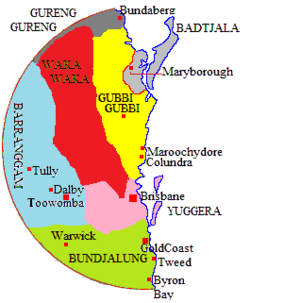Taribelang language facts for kids
Quick facts for kids Bunda |
|
|---|---|
| Native to | Australia |
| Region | Queensland |
| Ethnicity | Bunda, ?Taribelang |
| Extinct | (recent) |
| Language family |
Pama–Nyungan
|
| Dialects |
Gureng-Gureng
Guweng-Guweng
|
| AIATSIS | E33 E32, E33 Gureng-Gureng, Taribelang, E36 |
Taribelang, also known as Bunda, is an important language from Queensland, Australia. It was once the main language for the Taribelang and Bunda people. Today, fewer than 100 people speak it as a second or third language. This means it is not their first language. There is some discussion about how the Taribelang language (E33) relates to the Goeng Goeng language (E36). This information comes from Austlang, a project by the AIATSIS.
How Taribelang Sounds
Today, the way people speak Taribelang can be a bit different. Some speakers have a "heavier" sound. This means they might roll their "rr" sounds more. They also might start words with "Ng" instead of a single "N". Plus, they might say a "dj" sound where others say "ch" or "t". These "heavier" speakers often come from the western areas. These areas are along the Burnett River in Queensland.
Other speakers, especially those from coastal families, have a "lighter" way of speaking. They do not roll their tongues as much. They use a single "N" at the start of words instead of "Ng". They also use "ch" and "t" sounds more often than "dj". This "lighter" style might be because of the influence of the English language over time.
Bringing the Language Back to Life
Since 2017, the Central Queensland Language Centre has been working hard. They are helping to bring back three languages from their region. These languages are Yiiman, Byelle (Biyali), and Taribelang. This process is called language revival.
As of 2020, Taribelang is one of 20 languages chosen for special help. This help comes from the Priority Languages Support Project. This project is run by First Languages Australia. It gets money from the Department of Communications and the Arts. The project's main goal is to find and record languages that are in great danger of disappearing. These are languages that have little or no written information. They might not have any recordings, but there are still some people who speak them.
See also
In Spanish: Idioma gureng gureng para niños
 | Dorothy Vaughan |
 | Charles Henry Turner |
 | Hildrus Poindexter |
 | Henry Cecil McBay |


